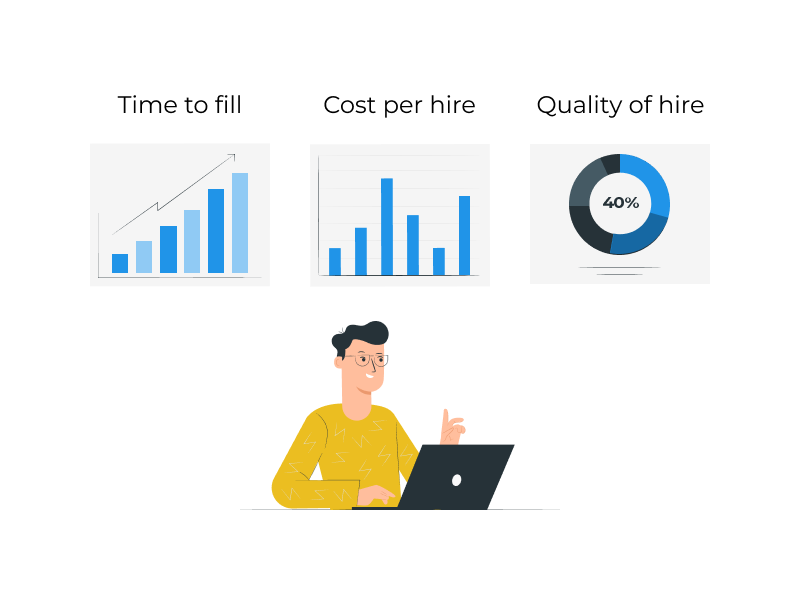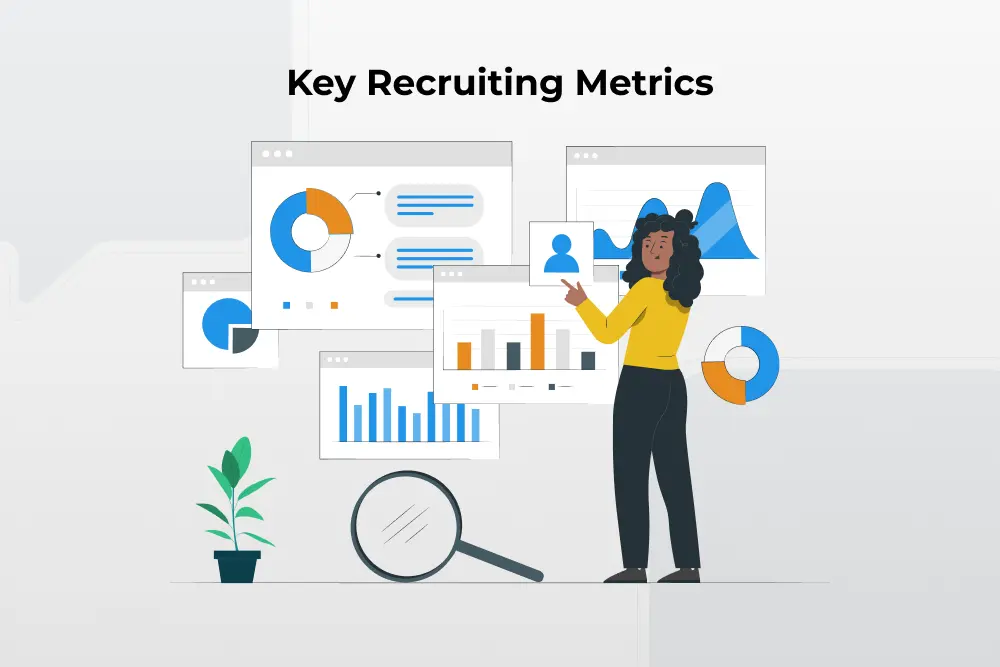In the world of talent acquisition, data-driven decisions are the foundation of successful recruitment. Analyzing recruiting metrics and key performance indicators (KPIs) is paramount to shaping your hiring journey effectively. In this blog, we will delve into the significance of these metrics and how they influence and guide your recruitment efforts.
The Significance of Recruiting Metrics
Why Metrics for Recruitment Matter
Recruiting metrics provide insights into the efficiency, effectiveness, and quality of your hiring process. By understanding these metrics, you can make informed decisions and optimize your recruitment strategies to align with organizational goals.
 Leveraging Recruitment Key Performance Indicators
Leveraging Recruitment Key Performance Indicators
The Power of Recruitment KPIs
Recruitment KPIs are quantifiable data points that offer a clear view of your recruitment efforts. They help you identify areas that require improvement and enable you to make data-driven decisions. We’ll explore how leveraging these KPIs can enhance your recruitment strategy.

Measuring Talent Acquisition Metrics
Talent Acquisition Metrics: A Comprehensive Approach
Talent acquisition metrics encompass a wide range of data points, including time-to-fill, cost-per-hire, and quality of hire. By measuring these metrics, you can gauge the efficiency of your talent acquisition efforts and identify areas for improvement.

Key Metrics for Shaping Your Hiring Journey
Hiring KPIs: Guiding Your Journey
Hiring KPIs, such as source of hires, retention rates, and candidate satisfaction, play a pivotal role in shaping your hiring journey. They help ensure that new employees are not only filling roles but are also a good fit for your organization’s culture and goals.
Understanding the Impact of Recruitment Metrics
Metrics in Action: Enhancing Recruitment
Recruitment metrics are not just numbers; they are essential tools for success. By analyzing these metrics, you can streamline your recruitment processes, enhance the quality of your hires, and manage your recruitment budgets effectively. We’ll delve into how these metrics impact your recruitment efforts.

FAQ: Frequently Asked Questions
What are recruitment metrics?
Recruitment metrics are quantifiable data points that help HR professionals and recruiters assess and measure various aspects of the hiring process. They provide insights into the efficiency, effectiveness, and quality of recruitment efforts.
How do recruitment KPIs work?
Recruitment KPIs are specific metrics that organizations use to evaluate and measure their recruiting efforts. These KPIs provide data-driven insights that help organizations identify areas for improvement and make informed decisions.
Why are talent acquisition metrics important?
Talent acquisition metrics help organizations assess the efficiency of their hiring process, measure the quality of their hires, and make data-driven decisions. They provide a comprehensive view of the talent acquisition efforts.
What are some key hiring KPIs?
Key hiring KPIs include source of hires (identifying where successful candidates are sourced), retention rates (measuring how long employees stay with the company after being hired), and candidate satisfaction (collecting feedback from candidates regarding their hiring experience).
How do recruitment metrics impact the hiring journey?
Recruitment metrics impact the hiring journey by guiding organizations to make informed decisions, streamline processes, enhance the quality of hires, and manage recruitment budgets efficiently. They play a pivotal role in shaping the success of the hiring process.
Conclusion
Analyzing key recruiting metrics is the compass that guides your hiring journey. These metrics enable you to make data-driven decisions, streamline processes, enhance the quality of your hires, and manage costs efficiently. They are not just numbers they are essential tools for success in the ever-evolving world of recruitment. By measuring, analyzing, and acting on these metrics, you’ll be better equipped to shape a successful hiring journey.










